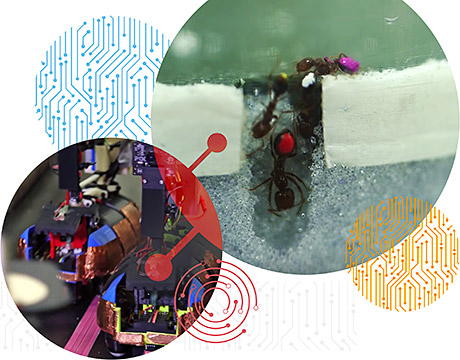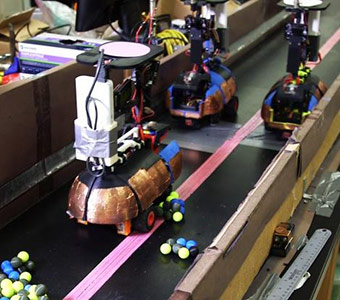"We wanted to know what they do when they're digging,how they decide how to dig if there's no central leader,"Goldman said.. T- |- s3 z+ a
Goldman說“我們想知道當(dāng)他們?cè)谕诰虻臅r(shí)候做了什么,,當(dāng)沒有中央領(lǐng)導(dǎo)人的時(shí)候他們是怎么決定怎樣挖掘的”,。
* U5 L4 j- |8 I& B2 h, V. xFor You:Racism Runs Deep,Even Against Robots& Z9 ]; g8 t( O! d1 V; e0 y
對(duì)你而言:種族注意深入人心,甚至對(duì)機(jī)器人
; K# g7 R/ H# b- U1 ITo find out,the team get 30 fire ants,put dots of different colors on their abdomens,placed them in a container of wet glass particles,and watched them dig.The team present its results in a recent issue of Science.
/ q$ v {4 C0 P/ H- Y6 F" ?為了找出答案,,這個(gè)團(tuán)隊(duì)捉了30只火蟻,, 在他們的腹部畫上不同顏色的點(diǎn),把它們放在有著濕玻璃顆粒的容器中,,觀察他們挖掘,。這個(gè)小組它研究結(jié)果刊登在最近的《科學(xué)》的問題中。
; i/ X7 V( f* W3 L O# ?2 ~5 j. ~ P' pThe ants didn't play tag team,work in alternating groups,or take turns in any other fashion.In fact,their strategy is quite simple:A handful of the ants did the work (about 30 percent)while the majority did nothing.6 n, y1 f4 {" d" _$ K+ z
螞蟻沒有玩標(biāo)簽團(tuán)隊(duì),,工作在可交替的組中,,以任何其他方式輪流。實(shí)際上,,它們的策略相當(dāng)簡(jiǎn)單:少數(shù)螞蟻工作(大約百分之三十)然而多數(shù)螞蟻什么也不做,。
2 e c6 `6 N4 H0 s1 b' D1 T"Very few were doing any of the labor,"Goldman said."Over 48 hours,with a group of thirty ants,half never came to the tunnel."
0 E8 w1 U" ]- [- g2 `! J- S“很少的螞蟻?zhàn)鋈魏喂ぷ鳌保珿oldman說“超過48小時(shí),,一個(gè)30只螞蟻的團(tuán)隊(duì),,半數(shù)沒有進(jìn)隧道�,!�' t9 m2 G" \- i
When his team remove the five hardest working ants,five more stepped up to the plate to carry on the digging.
. R8 Y! A y5 _3 u! z( y當(dāng)他的團(tuán)隊(duì)移走了五個(gè)工作最努力的螞蟻,,另外五只螞蟻爬到了平臺(tái)上繼續(xù)挖掘。! ~- h" Y* E# s: G
The strategy of minority servitude served the ants so well that Goldman decided to try it on a group of robots.
) D8 ^0 z/ S4 P) m: | n# J少數(shù)奴役的策略為螞蟻很好的服務(wù),,于是Goldman決定在一組機(jī)器人上嘗試這個(gè),。: w; i9 T! O& }( T$ r& t
The robots,essentially oblong shells on wheels,resembled armadillos more than ants.Researchers placed them in a narrow channel with plastic valls on( _7 Y0 [2 D4 h2 L
one end that served as the soil.The robots would roll over to the balls with the intention of grabbing them,moving them,and relasing them with their" z% e7 M: ]2 W8 X* k- a f
gator-like jaws.Push switches on their shells would alert them to the presense of their fellow workers.
9 `3 P% s, g' f8 ^0 U這些機(jī)器人,事實(shí)上是輪子上帶有橢圓形的殼,,類似犰狳而非螞蟻,。研究者們吧它們放在一個(gè)狹窄的渠道里,渠道的一端是作為土壤的塑料球,。機(jī)器人
- L4 M9 i2 A2 Q8 ]2 M R/ ]& T+ ~將翻滾到到球上,,通過使用鱷魚般的下巴有意的抓取他們,,移動(dòng)他們,,釋放他們。打開它們殼上的開關(guān)將提醒他們同時(shí)的存在。# G" {" }! y; F1 ?$ `
Researchers programmed the bots to follow one of the three strategies for removing the balls:"eager,""reversal,"and"lazy."
# d" f6 @ E T9 G5 l0 u5 ]研究者們給機(jī)器人編程遵循三個(gè)策略的其中之一去移走球:“急忙,,”“翻轉(zhuǎn),,”和“懶惰�,!�
7 h( l# i0 F8 c3 s8 uEager robots simply tried go to the dig site as much as possible without interference from their comrades,regardless of how many ) W+ o. r f' {9 x0 v5 i* j
robots were already there.The strategy generated a traffic jams."when we applied a eager strategy,the robots would grind against 7 l$ A" r: ?2 ]6 ^& g5 Q
each other and suffer a lot of breakage,"Goldman said.8 W; [* e$ A" V9 _
急忙的機(jī)器人不管來自同伴的干擾而只是嘗試去盡可能的挖掘地皮,,不管已經(jīng)有多少機(jī)器人在那兒了。這個(gè)策略形成了一次交通擁堵,。& v/ }5 y1 c& S k! _
Goldman說:"當(dāng)我們應(yīng)用急忙策略時(shí),,機(jī)器人會(huì)相互反制并且受到了很多破壞。"
( U) n" S+ l5 A' v: z6 _" uReversal robots would turn around and leave the site if they encountered other workers,but would soon return to try again.Lazy robots
7 b# ]# ?+ {6 A3 g- e& `3 owere largely inactive and would only head to the site to dig occasionly.
+ B, A0 e0 F/ [5 D# O4 f如果他們遇到了其他工作者的話,,翻轉(zhuǎn)機(jī)器人將會(huì)回轉(zhuǎn)并且離開地皮,,但是不久會(huì)返回再次嘗試。懶惰的機(jī)器人大部分不活躍,,只會(huì)偶爾去挖掘地皮,。
4 m) Z9 \' j! S1 x p' `( pWhen reversal-minded robots approached the balls and found another robot already at work they would turn around.This proved2 b4 F* X! e0 i) A* U/ I! ?* v
a relatively efficient scheme with no gridlock,but the work processed slowly.The lazy,ant-imitating robots,however,proved to be the 2 D% n! q7 y t* G# ^3 d. |3 ^* ]5 L
fastest at completing the task.0 f2 J( Z4 [+ A C3 n4 m
當(dāng)有翻轉(zhuǎn)思想的機(jī)器人接近球并且發(fā)現(xiàn)已經(jīng)有另一個(gè)機(jī)器人在工作時(shí),他們將回轉(zhuǎn),。這種做法被證明是一種沒有堵塞的相當(dāng)有效的方案,- z& `8 g& M5 t/ f0 t% Y" G Q
但是工作進(jìn)程慢,。那些懶的,模仿螞蟻的機(jī)器人,,然而,,被證明完成工作是最快的。
3 S: F9 ~/ P; i* [" ]' d- SThe strategy could be essential for tommorow's hordes of rescue bots."Future swarm of robots that are moving through a complex
; M' \8 p- K0 G Cenvironment after a nuture disaster,or when a building has collapsed,will be getting in each other's way,"Goldman said."This is a story " ~! h# o+ {8 n# X& f
about how to work with uncertainly and unpredictability."' B$ x0 B3 I1 v# X
這種策略會(huì)對(duì)將來的成群的救援機(jī)器人有效,�,!拔磥碓诘囊蝗簷C(jī)器人穿越一場(chǎng)自然災(zāi)害過后的復(fù)雜的環(huán)境,或者當(dāng)一棟倒塌后的大樓,將會(huì)
2 e3 v# P7 S" f* H9 n- B2 g互相幫助,,”Goldman說,。“這是一個(gè)關(guān)于怎樣處理不確定性和無法預(yù)料性的故事,�,!�4 h+ r7 _8 H! y8 X5 T( N
In the story,robots that talk with each other could take turns or replace robots that lose power or wear out."But then you have to know
' \# |: P1 p3 }8 Wwhat everyone else is doing,"Goldman said.This woud require the technology and programming for higher levers of communication.(As it3 m/ r$ j0 M5 O
happens,no one knows how ant chose which 30 percent does the work.)But having "lazy",autonomous robot,could keep things lean and
) A# g, M& J0 r0 W. |' Pefficient.
+ Q. |6 x9 o: ^0 N* P在這個(gè)故事中,機(jī)器人可以互相交流能回轉(zhuǎn)或者替代沒有電或者電力不足的機(jī)器人,�,!暗悄惚仨氈浪衅渌嗽诟墒裁矗盙oldman說,。$ f5 {/ n' X3 i) F$ @
這樣就需要技術(shù)和編程更高等級(jí)的交流,。(當(dāng)它發(fā)生的時(shí)候,沒人知道螞蟻是怎樣選擇哪30個(gè)做這個(gè)工作。)但是有了“懶的”,,自主性機(jī)器人,
$ E, e0 [! \, K* ?可以保持精益和高效,。
: A, u. x; w2 a: u! f L
8 K/ p$ o/ f% M" h0 z- F1 B$ ?- ^+ I9 ~' T: J. |; }4 {* D
Michael Abrams is an independent writer
3 l7 e9 u- k* Y$ J v摘自:https://www.asme.org/engineering ... e-ants-get-job-done1 B1 Z) `. B2 D T
|
|
|

 + p" S4 t, x% \4 d
+ p" S4 t, x% \4 d